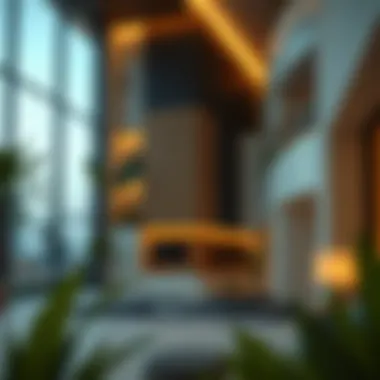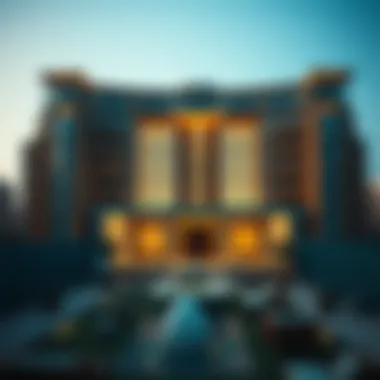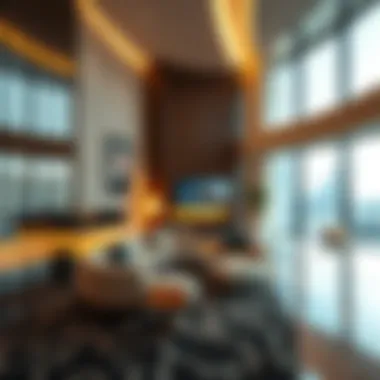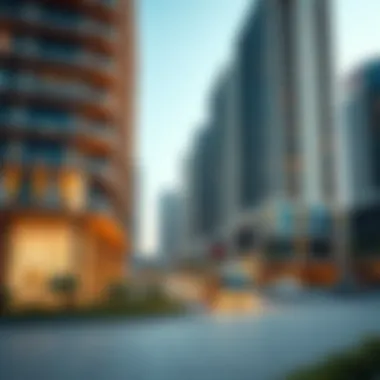Exploring Concept Seven Dubai's Real Estate Innovations


Intro
Dubai is no stranger to innovation, especially in the realm of real estate. In recent years, the city has seen a surge of projects that reimagine urban living, blending modern design with sustainable practices. Among these ventures stands Concept Seven, a transformative development that offers more than just homes. This exploration aims to navigate through the unique characteristics of Concept Seven, examining its architectural prowess, investment leverage, and its integration into the heartbeat of Dubai's dynamic property market.
Market Insights
Understanding the landscape of Dubai's real estate is critical for anyone considering an investment in Concept Seven or similar projects. The market is characterized by its responsiveness to global trends, local demand, and evolving lifestyle preferences.
Current Trends in Dubai Real Estate
As of now, the Dubai real estate sector is witnessing significant shifts. Investors are looking beyond traditional properties, favoring projects that emphasize sustainability and innovative architecture.
- Sustainable Designs: Developments that incorporate eco-friendly materials and energy-efficient systems are in high demand.
- Mixed-Use Developments: The preference for integrated communities that offer residential, commercial, and leisure spaces continues to grow.
- Smart Homes: Advances in technology are leading to the rise of smart homes, making the living experience more convenient and efficient.
These trends reflect a broader shift in consumer preferences, pushing developers like Concept Seven to prioritize features that enhance quality of life while contributing to environmental sustainability.
Predictive Analysis of Future Developments
Looking ahead, the UAE government's initiatives play a crucial role in shaping the future of Dubai's real estate. Policies aimed at diversifying the economy and attracting foreign investment will likely continue to influence market dynamics.
“The real estate sector is not just a reflection of the economy, but a driver of growth,” recent government reports suggest.
As such, we can expect upcoming projects to focus on:
- Affordable Luxury: With a demand for premium offerings at competitive prices.
- Cultural Integration: Developers are likely to design spaces that resonate with the rich heritage of Dubai, fostering community engagement.
Investors should keep an eye on these developments, as they could yield substantial returns in the future.
Investment Opportunities
For prospective buyers considering Concept Seven, understanding where the opportunities lie is essential.
High-ROI Neighborhoods
Despite the fluctuating property values, certain neighborhoods are emerging as hotbeds for high returns on investment. Areas like Dubai Marina, Downtown Dubai, and Jumeirah are renowned for their strategic locations and have consistently proven to deliver lucrative gains. Concept Seven's positioning could potentially capitalize on these growth hotspots.


- Dubai Marina: Offers a vibrant lifestyle, attracting expats and tourists alike.
- Downtown Dubai: The heart of the city, with iconic landmarks that draw continuous attention.
- Jumeirah: Known for its upscale residences and proximity to the beach, making it a desirable locale.
Tips for First-Time Investors
Navigating the Dubai real estate market can be overwhelming, especially for first-time investors. Here are a few tips that may ease the process:
- Research Extensively: Know the ins and outs of potential areas of investment.
- Engage Local Experts: Connecting with real estate agents who specialize in UAE properties can offer valuable insights.
- Understand the Market Sentiments: Keep updated on regulations and market fluctuations.
- Visit the Properties: Whenever possible, visit properties to get a firsthand experience of the surroundings and infrastructure.
Aligning with these strategies while investing in projects like Concept Seven can pave the way for a fruitful venture in Dubai's ever-evolving real estate landscape.
For further insights, you might find these resources helpful:
Understanding Concept Seven
Understanding Concept Seven provides essential insights into how this innovative approach has redefined real estate development in the heart of Dubai. This exploration sheds light on the distinctive attributes, strategic motivations, and lasting impacts of Concept Seven. As investors, homeowners, realtors, and analysts seek to navigate the complexities of the dynamic Dubai market, grasping these foundational elements is crucial.
At its core, Concept Seven emphasizes a fresh perspective on urban living. It combines cutting-edge design, sustainability, and community integration to create spaces that are not just dwellings but thriving ecosystems. By focusing on these principles, Concept Seven offers multiple benefits:
- Enhanced Lifestyle: The designs prioritize livability with ample communal spaces, promoting social interactions among residents.
- Sustainability Focus: Embracing eco-friendly practices in construction and operation aligns with the growing global emphasis on responsible living.
- Investment Viability: The innovative architecture and strategic location make properties under Concept Seven attractive for long-term investments.
Moreover, understanding the nuances behind the foundational principles and historical context of this concept elucidates how it meets the challenges posed by modern urbanization. The benefits are not solely anecdotal; market analysts have observed notable trends in buyer interest correlating with the principles laid out by Concept Seven.
"In a city bustling with activity and ambition, Concept Seven rises as a beacon of modernity, artfully blending functionality with a visionary aesthetic."
Historical Context
To fully appreciate the importance of Concept Seven, one must delve into its historical backdrop. The last two decades have seen Dubai transform into a hub of architectural innovation and economic prosperity. This rise was fueled by a unique combination of visionary leadership and substantial foreign investment.
In the early 2000s, as the pressures of rapid urban expansion began to mount, developers sought solutions that would not only address immediate housing needs but also elevate the urban experience. Amidst this landscape, Concept Seven emerged as a response to both the demand for modern living spaces and the necessity for sustainable development practices. The goal was clear: create a blueprint for future projects that would stand the test of time and offer residents an enriched way of life.
Between 2008 and 2015, during the global financial crisis, Dubai's real estate struggled, yet this period became a turning point for Concept Seven. The focus shifted towards revitalizing communities, and integrating design with practical living needs. As a product of its environment, Concept Seven became synonymous with resilience, adapting to economic shifts while redefining expectations in property development.
Foundational Principles


The foundational principles of Concept Seven can be distilled into several key tenets that drive its design and function. Understanding these principles is vital for investors and stakeholders alike:
- Community-Centric Development: Emphasizing shared spaces that foster interactions among residents has been a significant focus. This trend not only boosts the neighborhood spirit but also enhances property value over time.
- Innovative Architecture: The designs often reflect a blend of contemporary aesthetics with functional living, setting a benchmark in the real estate sector. Tall ceilings, natural lighting, and open layouts are hallmarks that attract buyers seeking modern comforts.
- Sustainability: With a strong emphasis on reducing carbon footprints, Concept Seven integrates renewable energy sources and promotes eco-friendly practices. This not only appeals to environmentally conscious consumers but also meets regulatory standards.
- Technological Integration: Smart home features and intelligent building management systems are essential components, offering enhanced convenience and security for tenants.
In summary, grasping the foundational principles of Concept Seven serves as a key to unlocking its potential for prospective stakeholders. By anchoring developments in community engagement, innovative design, sustainability, and technology, this approach ensures that properties not only meet current demands but are also prepared for the future.
Architectural Innovations
The realm of Architecture is undergoing a seismic shift, particularly in bustling markets like Dubai. As a pivotal segment of Concept Seven, architectural innovations are not merely a trend; they embody a holistic transformation in the approach to real estate design. The way buildings are conceived, constructed, and integrated into their surroundings can dictate their success in the marketplace. Investors and homeowners keenly observe these innovations, given their potential to elevate property value, enhance livability, and ensure sustainability.
Design Philosophy
In Concept Seven, the design philosophy is steeped in the idea that spaces should echo their environment while meeting the functional needs of the inhabitants. This approach goes beyond mere aesthetic appeal. It involves a deep understanding of the cultural and environmental factors that influence the community. Notably, there is an emphasis on open spaces that enhance social interaction—an essential aspect in a city known for its diverse populace.
- Cultural Reflection: The architectural styles often draw from Dubai’s rich tradition, layered with contemporary elements that capture the spirit of innovation. By integrating local arts and crafts into modern design, there’s a dialogue between past and the present.
- Functional Versatility: Buildings are designed to serve multiple purposes, allowing for adaptability over time. This is particularly important in fast-evolving locales where needs change.
- Community Focus: Thoughtful zoning and spatial organization ensure that amenities are accessible, fostering a sense of belonging.
Material Choices
Material selection in architectural projects under Concept Seven is pivotal, not just for aesthetics but for functionality and sustainability. The choices range from traditional materials like stone and glass to modern composites. This diversity of options ensures that structures are resilient and energy-efficient.
- Energy-Efficient Materials: Using materials that enhance energy efficiency is critical. For instance, glass designed to absorb heat during the day can significantly lower air conditioning costs, a vital consideration in Dubai's climate.
- Local Sourcing: Preference is often given to materials sourced locally to support the community and reduce carbon footprints associated with transportation. This could include locally mined stones or climate-resilient products supporting the Arabic architectural aesthetic.
- Innovative Composites: Advancements in technology have led to the utilization of composites that promise durability and lightweight properties, essential for high-rise developments.
Sustainable Practices
Sustainability in architecture is no longer just a buzzword; it is an imperative that drives design decisions at Concept Seven. The aim here is to minimize environmental impact while offering a high quality of urban life.
"Building sustainably is not merely a choice; it's our responsibility to future generations."
The sustainable practices include:
- Green Roofs and Walls: Implementing vegetation atop buildings and along walls maximizes insulation while promoting biodiversity in urban settings.
- Water Management Systems: Innovative techniques such as greywater recycling systems showcase how architecture can be part of the solution to water scarcity issues.
- Renewable Energy Utilization: Underground solar and wind energy systems are being adopted to power buildings, aligning with Dubai’s vision of becoming a green economy.
In summary, architectural innovations within Concept Seven Dubai leverage design philosophy, material choices, and sustainable practices for a holistic development approach. Each element works in synergy to create spaces that are not just structures but rather fulfilling environments. Understanding these innovations is vital for investors and developers wishing to make informed decisions in a rapidly changing market.
Market Positioning


Market positioning plays a crucial role in defining the landscape of Concept Seven in Dubai. It’s not just about where a property stands geographically; rather, it encompasses how the project aligns itself with the broader market demands and expectations of its audience. In a city as dynamic as Dubai, understanding market positioning involves a multilayered approach, taking into account demographic trends, competitive characteristics, and investment appetites. This section explores these elements, shedding light on why effective positioning is vital for upcoming ventures in the real estate sector.
Target Demographics
The target demographics for Concept Seven are varied but distinctly focus on a few key groups. Investors and homebuyers are increasingly diverse, reflecting international trends. Young professionals, affluent expatriates, and families looking for a vibrant community are the ones particularly attracted by Dubai’s real estate. This wealth of opportunities shapes the project’s vision and functionality.
For instance, consider the influx of tech-savvy workers in design and creative fields. These individuals often seek residences that blend functionality with aesthetics. Thus, Concept Seven caters to such preferences by incorporating amenities that resonate with modern lifestyles, such as co-working spaces and community hubs.
In summary, understanding these distinct groups not only underpins effective marketing strategies but also helps in the design and development phases, ensuring that properties meet the expectations of potential buyers or renters.
Competitive Analysis
Navigating the competitive landscape in Dubai’s real estate market requires a keen understanding of not only what similar projects offer but also how they position themselves. Concept Seven must keep a close eye on rivals such as Emaar Properties, which is known for luxurious developments, or DAMAC Properties, which has garnered attention with its high-end offerings.
- Price Range: By comparing the pricing structures of similar developments, it helps identify a profitable yet competitive price point for Concept Seven.
- Unique Selling Propositions: What can Concept Seven offer that others do not? Perhaps it’s state-of-the-art eco-friendly technology or unique architectural styles that speak to the local cultural heritage.
- Reputation and Branding: The perception of competitors in the market may influence how potential customers view Concept Seven. Establishing a strong brand identity from the onset is essential to differentiate it.
"In a saturated market, standing out is not just beneficial; it’s necessary for survival."
In essence, a thorough competitive analysis informs strategic decision-making, allowing Concept Seven not only to compete effectively but to thrive in an ever-evolving marketplace.
Investment Potential
Understanding the investment potential tied to Concept Seven Dubai is vital for anyone looking to stake their claim in Dubai's real estate market. This segment goes beyond mere aesthetics or design principles; it zeroes in on the hard-nosed realities of investing in a rapidly evolving landscape. For investors, particularly those who are taking their first plunge into this vibrant market, the nuances of investment potential can mean the difference between a lucrative portfolio and a financial misstep.
Return on Investment Analysis
The crux of any investment discussion often lies in the return on investment (ROI). Analyzing ROI for Concept Seven involves evaluating the anticipated rental yields, property appreciation rates, and the overall economic climate in Dubai. The development’s strategic location naturally adds to its value; proximity to transport, commercial hubs, and leisure facilities can significantly influence demand.
According to reports from real estate firms like DBA Real Estate, rental yields in Dubai generally hover around 6-8%, but for standout projects like Concept Seven, this figure could very well tread upwards.
Some may ask:
- What factors promote higher rental yields?
- Location: More central areas command higher interest.
- Amenities: Properties with modern conveniences attract tenants.
- Community: A vibrant neighborhood can pull more renters.
Calculating ROI requires understanding various elements:
ROI = (Net Profit / Cost of Investment) * 100







